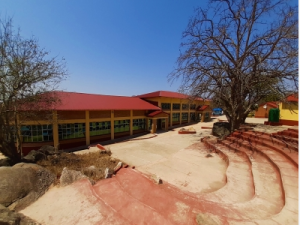The Essentials
Type of Institution: College
Fees per Semester: US$150.00 to US$400.00
Address: P Bag 3716 Marondera, Zimbabwe
Phone Number: +263 65 2324484
Principal: Mr. Roy Mavunga
Number of students: 500+
Website: https://elearning.kpp.ac.zw/
Email: admissions@kpp.ac.zw
Table Of Contents
- Overview
- Contact Details
- Address
- Location
- School Fees
- Courses & Programs
- Vacancies and Entry Requirements
- Logo
- Notable Alumni
- Pros and Cons
- Author’s Review
Overview
Kushinga Phikelela Polytechnic is a well-established vocational and technical training institution located in Marondera, Zimbabwe. The polytechnic offers a variety of programs aimed at equipping students with practical skills in agriculture, engineering, and other technical disciplines.
It plays a vital role in the development of Zimbabwe’s workforce by producing skilled professionals who can contribute to the country’s industrial, agricultural, and economic growth.
Agricultural Focus
Kushinga Phikelela is known for its strong emphasis on agricultural training, with specialized programs in crop and livestock production, agricultural engineering, and agribusiness. It provides hands-on experience through fieldwork and practical demonstrations, preparing students for real-world agricultural challenges.
Technical Training
The institution offers robust engineering and technical programs, including civil, mechanical, and electrical engineering. These programs are designed to produce skilled artisans and technicians. The college’s workshops are equipped with modern machinery and tools for hands-on practical learning.
Business and Commercial Courses
In addition to technical and agricultural programs, the polytechnic offers courses in business management, marketing, and entrepreneurship to develop well-rounded professionals capable of running enterprises.
Target Audience
Kushinga Phikelela Polytechnic caters to students seeking to develop vocational skills in technical fields, agriculture, and business. It also provides training for individuals from rural areas, emphasizing skills that are relevant to improving rural livelihoods and productivity.
Certifications and Diplomas
Graduates earn diplomas and certificates in their respective fields, which are recognized nationally and internationally, enhancing their employability and career prospects.
Community Impact
The institution contributes to local and national development by providing training programs that empower individuals with technical skills, helping them become self-reliant or securing employment in various industries.
Kushinga Phikelela Polytechnic Contact Details
You can contact Kushinga Phikelela Polytechnic via their landline, email or you can visit their website for further contact details.
Phone Number: +263 65 2324484
Website: https://elearning.kpp.ac.zw/
Email: admissions@kpp.ac.zw
Kushinga Phikelela Polytechnic Address
P Bag 3716 Marondera, Zimbabwe
Kushinga Phikelela Polytechnic Location
Kushinga Phikelela Polytechnic is located just outside the city of Marondera in the Mashonaland East province of Zimbabwe.
Kushinga Phikelela Polytechnic Fees
Kushinga Phikelela Polytechnic fees is currently standing at US$150.00 to US$400.00 per term depending on the program you are studying. Please contact the institution or visit them to get the latest fees structure as it can change at any term or semester.
Kushinga Phikelela Polytechnic Courses & Programs
Kushinga Phikelela Polytechnic offers a diverse range of vocational and technical courses aimed at equipping students with practical skills in various fields.
Agriculture:
Diploma in Agriculture
Crop Production
Animal Husbandry
Agricultural Engineering
Agribusiness and Farm Management
Engineering:
Civil Engineering: Focus on construction, surveying, and structural engineering.
Mechanical Engineering: Includes training in machinery maintenance, design, and fabrication.
Electrical Engineering: Covers electrical installations, maintenance, and industrial electronics.
Food Technology:
Diploma in Food Processing and Technology: Training in food production, safety, and preservation methods.
Business and Commercial Studies:
Diploma in Business Studies
Specializations in: Accounting, Marketing, Business Management
Diploma in Secretarial Studies
Specializations in: Office management, business communication, and IT skills for administrative roles.
Information Technology:
Diploma in Information Technology: Focuses on computer programming, networking, database management, and IT support.
Environmental Studies:
Diploma in Environmental Management: Studies on sustainable land use, natural resource management, and environmental conservation.
Textile and Clothing Technology:
Diploma in Textile and Fashion Design: Garment making, fashion design, and fabric technology.
Horticulture:
Certificate/Diploma in Horticulture: Training in growing vegetables, fruits, and ornamental plants.
Farm Management
Certificate in Farm Business:
Management: Focuses on the economics and administration of farm enterprises.
Plumbing and Pipe Fitting:
Certificate in Plumbing: Training in water systems installation, maintenance, and sanitation engineering.
Motor Mechanics:
Diploma in Automotive Engineering: Covers vehicle repair, maintenance, and diagnostics.
Kushinga Phikelela Polytechnic Vacancies and Entry Requirements
Kushinga Phikelela Polytechnic offers various vocational and technical programs, and vacancies for these courses typically depend on the intake periods and the capacity of each department.
Vacancies
Vacancies are usually offered yearly on almost every course and program mentioned above. Visit the institute’s site or contact them via email and mobile call to get the latest and accurate vacancies available.
Entry Requirements
The entry requirements for the programs offered at Kushinga Phikelela Polytechnic may vary depending on the course.
Academic Qualifications:
Ordinary Level (O-Level):
*Most diploma programs require a minimum of 5 O-Level passes, including English Language, Mathematics, and sometimes Science depending on the course.
*For certificate programs, at least 3 to 5 O-Level passes are typically required.
*Agriculture Programs: A strong interest in agriculture or farming is necessary, with passes in Agricultural Science or related subjects being an advantage.
Specific Program Requirements:
Engineering Programs: Students applying for Civil, Mechanical, or Electrical Engineering programs must have passes in Mathematics, Science, and Technical Drawing or related subjects.
Business Studies: For programs like Accounting or Marketing, a pass in Mathematics and Commerce is advantageous.
Information Technology: Requires a good grasp of Mathematics and Science. Prior knowledge in computer studies is an added advantage.
Food Technology: Applicants should have an O-Level pass in Science (e.g., Chemistry or Biology).
Age Requirement:
Most students are required to be at least 16 years of age or older. There is no upper age limit for most programs.
Work Experience (Optional):
Some programs may benefit from applicants having prior experience or interest in the related field, although this is not always mandatory.
Aptitude Tests (If Applicable):
Certain technical programs may require applicants to sit for an aptitude test, especially if the course is highly competitive.
Application Process
Applicants are required to complete an application form and submit copies of their academic certificates, national ID, and sometimes a birth certificate.
In some cases, the polytechnic may also request a personal statement explaining the applicant’s interest in the chosen field.
Kushinga Phikelela Polytechnic Logo
Below is the logo of Kushinga Phikelela Polytechnic with excellent quality and it is available to download in PNG (transparent file) JPEG and PDF.
Kushinga Phikelela Polytechnic Pros and Cons
Pros
Strong Focus on Agriculture: Kushinga Phikelela is well-known for its specialized programs in agriculture, including crop production, animal husbandry, and agribusiness. This makes it an ideal institution for students interested in agriculture-based careers.
Practical Training: The institution emphasizes hands-on, practical training, especially in fields like agriculture, engineering, and food technology. Students gain real-world skills that are immediately applicable in their industries.
Wide Range of Courses: The polytechnic offers a diverse selection of programs across different fields such as engineering, business studies, IT, and agriculture. This variety ensures that students can pursue specialized skills based on their interests.
Contribution to National Development: By offering programs geared toward skills development in key sectors like agriculture and technical engineering, the polytechnic plays a significant role in Zimbabwe’s industrial and agricultural development.
Accessible Location: Located in Marondera, the polytechnic is accessible to students from nearby rural and urban areas, providing education opportunities to a broad demographic.
Affordable Tuition Fees: As a government-affiliated institution, Kushinga Phikelela Polytechnic typically offers affordable tuition fees compared to some private colleges, making it accessible to a wide range of students.
Industry-Relevant Skills: The curriculum is designed to meet the needs of the job market, particularly in sectors such as agriculture and engineering, increasing students’ employability.
Cons
Limited Advanced Programs: While the polytechnic offers diploma and certificate programs, it may not provide more advanced degree programs (such as bachelor’s degrees), limiting further academic progression within the institution.
Rural Location: Although the rural setting is ideal for agricultural programs, students from urban areas may find the location inconvenient, and there may be fewer amenities compared to urban polytechnics.
Limited Infrastructure and Resources: Like many institutions in Zimbabwe, the polytechnic may face challenges related to outdated equipment or limited resources, especially in technical departments. This could impact the quality of training in some areas.
Competitive Admission: Due to its reputation and affordability, Kushinga Phikelela Polytechnic can be highly competitive, meaning that not all applicants may secure a place in their preferred programs.
Fewer Networking Opportunities: Compared to larger polytechnics or universities, Kushinga Phikelela might offer fewer opportunities for industry connections, internships, or large-scale research projects, particularly in non-agricultural fields.
Limited Exposure to Cutting-Edge Technology: While the polytechnic provides solid training in traditional industries, it may not always offer exposure to the latest technological advancements, especially in rapidly evolving fields like IT and advanced engineering.
Author's Review
Kushinga Phikelela Polytechnic stands out as a prominent vocational and technical training institution in Zimbabwe, particularly noted for its robust programs in agriculture and practical skills development.
Its strong focus on hands-on training ensures that students acquire relevant and immediately applicable skills, making it a valuable choice for those pursuing careers in agriculture, engineering, and business.
The polytechnic’s wide range of programs offers students diverse educational opportunities, and its affordable tuition fees make it accessible to a broad demographic. Its practical approach to education aligns well with Zimbabwe’s developmental needs, especially in agriculture and technical fields.
However, prospective students should consider some limitations, such as the rural location of the institution, potential challenges with infrastructure and resources, and the lack of advanced degree programs
Despite these challenges, Kushinga Phikelela Polytechnic remains a commendable choice for students seeking vocational training and practical experience in key sectors. The institution’s commitment to developing industry-ready professionals is evident and continues to contribute positively to both individual careers and national development.




